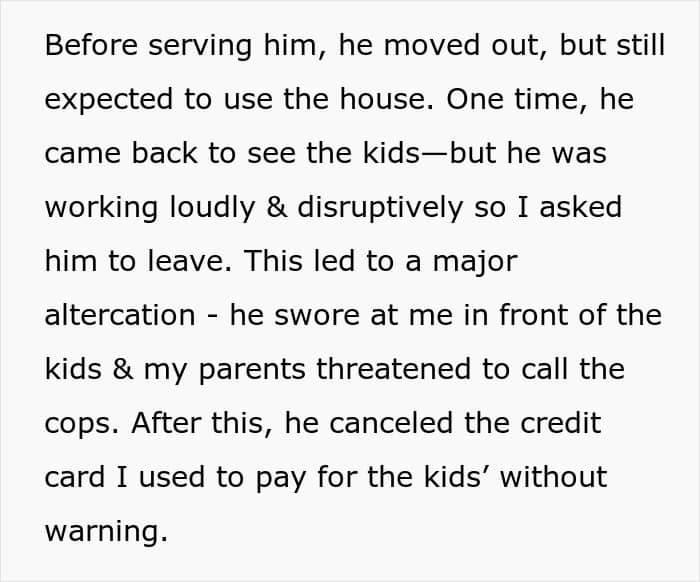The beginning of a marriage is often magical, but when it comes to an end, it can bring out a side of someone you barely recognize. It’s enough to make you wonder if the person you once fell in love with was ever really there at all.
This Redditor’s husband first suggested a separation while she was pregnant with their second child. She tried to hold the relationship together, but despite his decision to leave, it was ultimately she who served him the divorce papers.
What followed was a string of questionable choices on his part—ones that make it clear how messy things can get. Read on to see what happened, and don’t miss our conversation with divorce coach Chloe Oudiz, who explains why people often behave out of character when a relationship starts to fall apart.
RELATED:The man stunned his postpartum wife by asking for a divorce

But when she served him the papers, he was the one who got messy


















Why does divorce bring out the worst in people?
Most of us don’t walk down the aisle imagining we’ll one day be shouting at each other through lawyers instead of living out the whole “till death do us part” thing.
And yet, divorce is incredibly common. While the often-quoted claim that half of all marriages end in divorce is a bit of an exaggeration, it’s not too far off. Research shows that around 41% of first marriages in the U.S. eventually dissolve.
That means a lot of people know what it’s like, and chances are, it wasn’t exactly a pleasant experience. Divorce, by nature, is emotionally and logistically messy.
Still, you’d hope that during such a difficult time, people might treat each other with some basic compassion, if they once loved each other deeply. But in reality, that’s more the exception than the rule.
Why is that?
We got in touch with Chloe Oudiz, certified divorce coach and author of Don’t Screw Up Your Divorce, to find out.
“As we know, divorce is often associated with hurt and sadness. This means that our emotional brain (the amygdala) is highly activated and our rational brain (the pre-frontal cortex) isn’t getting enough blood to be able to process information in a calm and reasonable way,” Oudiz explained.
In other words, we tend to enter a fight-or-flight state, becoming reactive, defensive, or even aggressive. Oudiz notes that this is a physiological response, not necessarily a reflection of someone’s character.
When people feel vulnerable or unsafe, they’re simply not at their best. Fortunately, emotions usually settle with time, allowing both parties to return to a more rational state of mind.
“But keep in mind that everyone processes grief in a different way and on their own timeline. Some people are able to regulate their emotions and reach acceptance quite fast while others hold on to resentment for years,” noted Oudiz.
Adding to the difficulty, divorce often doesn’t happen in a vacuum. The involvement of friends, family, legal teams, and outside opinions can heighten the pressure and make it harder to stay grounded.
“This is where reminding yourself of your core values will be very important. First of all because being belligerent will not serve your strategic interests with regards to how the divorce unfolds, but also because you don’t want to look back with regret or shame on how you behaved,” Oudiz said.
Fortunately, there are ways to keep conflict from escalating, even when emotions are high.
One of those tools is strategic empathy—the deliberate effort to understand another person’s thoughts, motivations, and emotions not just to connect, but to communicate more effectively and make sound decisions.
Another helpful strategy is mirroring. Asubtle technique that involves reflecting someone’s gestures or tone to help create a sense of trust and calm during difficult conversations.
“The main point is that it boils down to recognizing that your or your spouse’s reactive, emotional brain is leading at that moment and this means the conversation must end. We physically cannot have a peaceful conversation when we are in ‘fight or flight’mode,” said Oudiz.
“Trying to come back to the present will help you snap out of your emotional reaction,” she added. “Simple tricks such as counting to three before speaking or flicking a rubber band against your wrist can force your brain to come back to the present and return to a more rational state.”
“But if that doesn’t work, or if you realize that your spouse is too triggered, the best solution is to stop the conversation and resume it at a later time, when you are both feeling calm.”

The woman followed up in the comments to clear up some details





Readers told her she was doing the right thing and advised her to keep a record of her husband’s behavior













